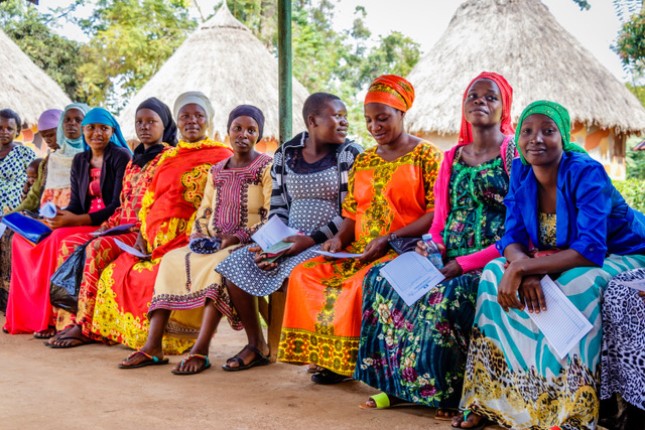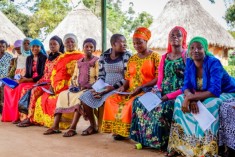-
ICPD25: Quality of Care and Universal Health Coverage Should Be Basic Human Rights
December 2, 2019 By Sarah B. Barnes The Nairobi Summit on ICPD25 was an opportunity for the global community to re-commit to the unfinished objectives of the 1994 International Conference on Population and Development’s (ICPD) Programme of Action and accelerate the progress to achieve the Sustainable Development Goals by 2030.
The Nairobi Summit on ICPD25 was an opportunity for the global community to re-commit to the unfinished objectives of the 1994 International Conference on Population and Development’s (ICPD) Programme of Action and accelerate the progress to achieve the Sustainable Development Goals by 2030.
The Nairobi Summit on ICPD25 was an opportunity for the global community to re-commit to the unfinished objectives of the 1994 International Conference on Population and Development’s (ICPD) Programme of Action and accelerate the progress to achieve the Sustainable Development Goals by 2030.
Access to sexual and reproductive health (SRH) services and a rights-based approach are essential to meeting the Summit objectives and the 1994 Cairo ICPD meeting’s original objectives of zero maternal deaths, zero unmet need for family planning, and zero gender-based violence and other harmful practices to women and girls. “At the heart of the ICPD paradigm shift in 1994 in Cairo was human rights,” said Lynn Freedman of Columbia University, “Over the last 25 years, maternal mortality and safe childhood has become a hugely important part of the way that the human rights field and the human rights practice has developed.”
And progress has been made. Recent figures show a 38 percent reduction in maternal mortality rates, globally, but increased disparities between and within countries suggest more needs to be done. Two-thirds of all maternal deaths are in sub-Saharan Africa. Some 46 million childbirths will likely face complications by 2030, according to UNFPA. To avert tragic outcomes, strong political commitments and an estimated US$4 billion are needed.
Why Universal Health Coverage Matters
Currently, 800 million people spend at least 10 percent of their household earnings on health expenses for themselves or a family member, said Nana Poku the Vice Chancellor and Principal of the University of KwaZulu-Natal. And for many, these expenses are high enough to push them into extreme poverty. The world’s most marginalized still experience barriers to quality health care and universal health coverage (UHC) is an opportunity to improve access and uphold their rights. UHC would ensure that all people have equal access to quality promotive, preventive, curative, rehabilitative, and palliative basic health services without facing financial hardship.
In order to achieve universal health coverage, Dr. Ian Ashew, WHO’s Director of Reproductive Health and Research, said that we must expand access to services. All 193 UN member states have unified statements to the right of all people to universal health coverage. World leaders made a political declaration recommitting to achieving UHC by 2030 at the 74th session of the United Nations General Assembly.
Any universal health coverage must include sexual and reproductive health and rights (SRHR), as it’s an important part of the health and well-being of people. “We cannot hope to achieve UHC without making real changes toward SRHR [sexual and reproductive health and rights],” said Poku.
Universal health coverage has two components, the finance gap and the workforce gap, said Poku. Governments need to channel more funds in their budgets for SRH services and building a skilled workforce. Governments across Africa want to earmark 25 percent of their funding for health services, but are not there yet, said the Vice President of Liberia, Jewel Howard Taylor.
But words by themselves won’t suffice. “True love is only shown in budgets,” said Gabriela Cuevas Barron, the President of the Inter-Parliamentary Union of Mexico. “There are lots of things to do on the planet. We need to be clear that this is a priority.”
Quality of Care
Poor quality of care is one of the greatest challenges current health systems face. Years of focus on improving access by increasing numbers of healthcare facilities and healthcare workers has at times led to empty buildings and unskilled providers. Medical interventions have become indicators of quality, when in actuality, increased rates of procedures like cesarean deliveries are signs of poor quality. Too much too soon and too little too late are common dichotomies of care throughout the world. To improve desired health outcomes and increase quality of care, according to the World Health Organization, health care must be safe, effective, timely, efficient, equitable, and people centered.
“Quality of care is poorest for the most vulnerable—including the poor, the less educated, adolescents, those with stigmatized conditions, and those at the edge of the health system, such as people in prisons and the homeless,” said Caroline Homer, Co-Program Director of Maternal and Child Health at Burnet Institute. Having visited a health facility with no power, no water, no patients, and one unskilled health worker, Homer came face to face with the reality that “for some, no health care is better than poor quality of care.”
Sometimes the care is so poor that it has serious repercussions. More than one-third of women experienced mistreatment during childbirth in health facilities, according to a recent study in Ghana, Guinea, Myanmar, and Nigeria. This type of mistreatment is a global human rights issue and leads women to avoid services, which means they don’t access wanted family planning, they don’t get tested for HIV or attend prenatal visits, or they seek unsafe abortions sometimes with terrible consequences, said Homer. Young people avoid healthcare facilities where they feel unsafe or disrespected. “Quality should not be just an aspiration,” said Dr. Joannie Marlene Bewa, Founder and Executive Director of Young Beninese Leaders Association, calling for it to be a reality. “It should be a basic human right,”
Safe Pregnancy and Childbirth
“Safe childbirth is not only a survive agenda, but a thrive agenda,” said Freedman. “The risk that a 15-year-old woman will eventually die from maternal causes is 1 in 45 in low-income countries and 1 in 5,400 in high-income countries.” In low income settings, this is partially due to the huge barrier women face in accessing care once they are referred from lower to higher levels of care. Indigenous women find it especially hard to access higher levels of care outside their communities, said Her Excellency M. Lydia Mikolo, the Minister of Health and Population of the Republic of the Congo. Even when health care is free for indigenous people, sometimes they need to travel by boat and services can be hundreds of kilometers away from their home. And then the woman presents with issues and dies because she cannot get a cesarean delivery.
In order to improve maternal and newborn outcomes, experts underscored the importance of changing how we work. “Imagine how sharing our power can make a better world instead of thinking that sharing our power, weakens us,” said Freedman. We need to start listening to those voices demanding that we change our way of working, we need to hear them and we need to join them.
A new way of working would involve strong advocacy, not just from the civil society, but also from religious leaders, political leaders, so together we can create alliances, said Askew. Women and communities must also be at the decision-making table. “From a private sector point of view, I think we can’t achieve the goals that we want to achieve without local partner providers and we need to make sure they’re integrated into our care strategy,” said Temitayo Erogbogbo, Global Director of Advocacy at Merck for Mothers.
We also need to imagine better ways of working together. “Midwifery led care and the continuum of care from midwives can improve the outcomes,” said Askew, pushing for primary care and the role of nurses and midwives to be central in any agenda. Research shows evidence of the importance of midwife-led care, but also shows that 65 percent of midwives in sub-Saharan Africa felt abused by other health care providers. So it’s time for a new way of collaborating through teamwork. Strategy isn’t enough. “This is a long road,” said Franka Cadee, President of the International Confederation of Midwives. “Even if we have strategy, culture eats strategy for breakfast. We need to be committed as a whole team.”
To improve maternal and newborn outcomes, women and girls can no longer be left out of the conversation about what they need and want. Quality cannot be improved without bringing women and girls to the table at every stage of the planning, implementation, and discussion surrounding their health and rights.
The leading cause of maternal mortality in Kenya for 9 out of 10 women was lack of quality care, according to the Minister of Health in Kenya. What happened to them? They died on the weekend, they died without an OB-GYN or midwife, they died because they were working that day and couldn’t get to a facility, they died because the facility could not save lives, said Angela Nguku the National Coordinator of White Ribbon Alliance, Kenya. “Quality of care should also be a basic human right,” she said.
“Put the ‘R’ back in SRHR!” said Olabukunola Bukky Williams, CEO of Education as a Vaccine. “We’re not going to achieve the change we want without focusing on the rights.”
Sources: ICPD25, International Confederation of Midwives, United Nations, UNFPA, WHO
Photo Credit: Photo via Shutterstock. All rights reserved.
 A Publication of the Stimson Center.
A Publication of the Stimson Center.

 The Nairobi Summit on ICPD25 was an opportunity for the global community to re-commit to the unfinished objectives of the 1994 International Conference on Population and Development’s (ICPD)
The Nairobi Summit on ICPD25 was an opportunity for the global community to re-commit to the unfinished objectives of the 1994 International Conference on Population and Development’s (ICPD) 

